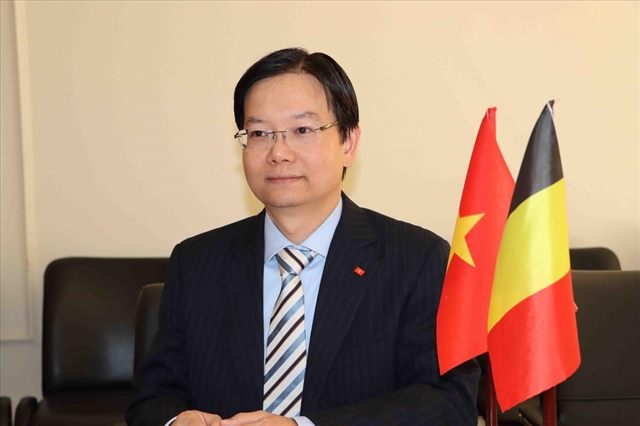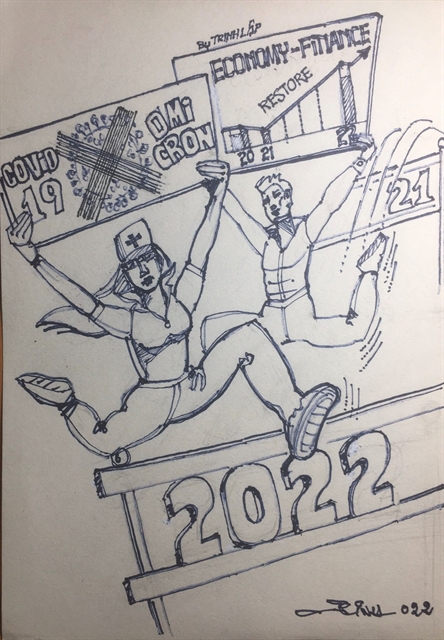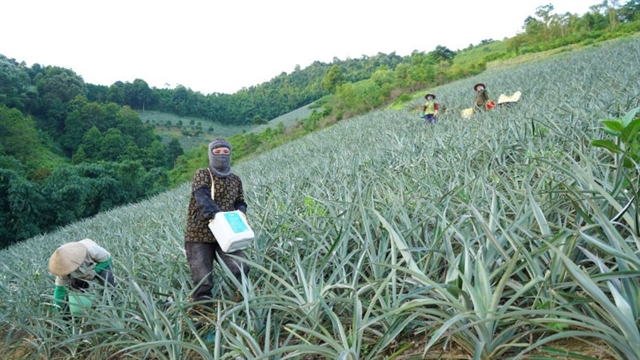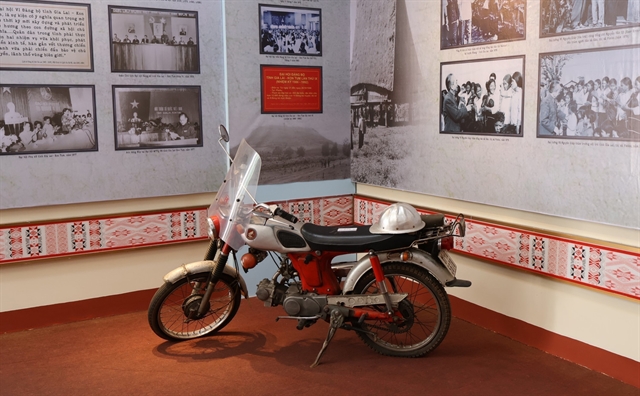 Talk Around Town
Talk Around Town

Forty years on, the New Year song by Swedish band ABBA finds new relevance in the time of COVID

|
| Illustration by Trịnh Lập |
By Nguyễn Mỹ Hà
If you are an expat living in Việt Nam, you have probably come to dread the popular ABBA Happy New Year song played so often at this time of the year. A few weeks before and even after New Year's Eve, the upbeat tune can be heard throughout the country, from city cafes to country weddings to small-town tea houses.
It is a sad song, really, but why did it become such a happy melody that everyone can relate to?
"If you read the lyrics, it's all sad and the devastating words of something finished, completed, over," says Phạm Hòe, an avid ABBA fan in his 60s.
"But the music sounds so hopeful, soothing, and the repetition of the words 'Happy New Year' somehow pushes us further forward."
He may be right, “hope" is something everyone is trying to hold as the crushing year of 2021 comes to an end.
On Tuesday, December 28, the first patient diagnosed with Omicron, the highly contagious coronavirus variant, was confirmed by Central Military Hospital 108 in Hà Nội. While the majority of the population were anxious and waiting for this to come, health workers knew it was only a matter of time until Omicron was detected in the country. The health system must now expand its already stretched resources to study and treat patients with the new variant.
The Hà Nội Head of Health Department Trần Nhị Hà has publicly announced on national TV that the booster shot shall be carried out during the first quarter of the New Year.
"We also provide vaccine shots for patients with other diseases still staying in hospital,” she said.
On one hand, the health workers have been working overtime, double or even more than their usual capacity, on the other, numerous fraud cases have been brought to trial, involving health officials or companies hiking kit test prices and medication, or allowing even fake medicine to be delivered to patients.
Both the God-given good nature of doctors, nurses and other health workers and the dark exploitative nature of so-called patient blood-suckers have been shown in broad daylight. As much as we respect the work doctors, nurses and public health community units have been doing, we have every reason to doubt if we can ever get our people in better health if corrupt health officials and companies can get away with manipulating the system for their benefit.
The ravaging pandemic doesn't look likely to end any time in the foreseeable future.
When Việt Nam achieved a good level of vaccination among the population and decided to go with what it called, "co-existence with the virus", i.e. "the new normal", it could open its internal borders.
Rising new cases forced China, Việt Nam's northern neighbour, to close its borders. When this major market, where a great number of Vietnamese farm produce goes, shut its border, thousands of tonnes of fruit and vegetables containers were left stranded at the border after a number of drivers tested positive for COVID.
The export crisis affects both sides. On the Chinese side, a similar amount of container trucks have also been waiting to get through.
The China ambassador has asked for patience from Vietnamese authorities, saying China has 1.4 billion people and it's not pursuing a "co-existence with COVID" policy, instead opting for a zero-COVID approach.
After two years of sanitation work, vaccination campaigns, booster shots and enormous efforts and sacrifices of the health sector and medical workers, the coronavirus still remains beyond the reach of any human effort to stop it from spreading further, effortlessly morphing into ever new variants
Hà Nội has topped the list of new cases in the country for well over a week. The rate of vaccination in the country has reached over 60 per cent, much higher than the WHO expectation rate of 40 per cent.
While overall new cases are mildly slowing down, the number of new cases in Hà Nội could top 2,000 per day.
The first week in the New Year, the city may set new records in terms of both community cases and new patients under quarantine.
When reality strikes, people tend to turn to hope to lift their morale, and turn away from the dark truth, but ABBA does not shy from it:
"Sometimes I see / How the brave new world arrives / And I see how it thrives / In the ashes of our lives / Oh yes, man is a fool / And he thinks he'll be okay / Dragging on, feet of clay / Never knowing he's astray..."
The lyrics of this otherwise feel-good song are insightful and down to earth as if coming from the lips of an ancient prophet, not Swedish popstars from the seventies.
Maybe this year, fans of this classic ABBA song will find a new level of meaning in its lyrics, written so many years ago.
ABBA fans around the world earlier this year were enthralled about the news of the band coming together to release new music, so many years after breaking up. Members of the group, having gone on with their lives or overcome personal life crises, would once again put what separated them behind to stand together and be connected by their music.
It will be an emotional get-together, but I don't think they're going to transmit the same level of energy, creativity or musicality they once did. It's a much-longed-for reunion, but beware, it may disappoint more than it rewards.
But their music, no matter if sung by them, or by actors in the Broadway musical Mama Mia, or the two movies of the same name, shall transcend time and language, to deliver hope to almost everyone who has heard the melodies. As the song goes:
"Happy new year, happy new year / May we all have our hopes, our will to try / If we don't we might as well lay down and die / You and I ..."
If we don't want to lie down, then try, at least, keeping to the 5K rules: face mask, disinfection, distance, no gathering, and health declaration; and remember to keep up your morale to get through this gloomy time.
Happy New Year!




